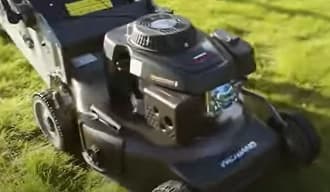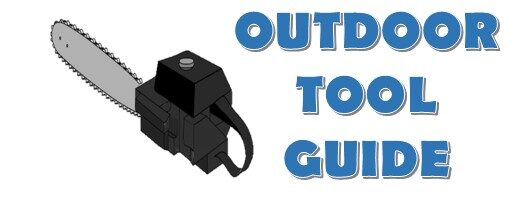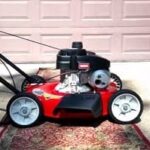As an Amazon Associate, this site earns commissions from qualifying purchases. For more information click here.
Cutting grass with a lawn mower in the summer is commonplace. It’s something most of us take for granted. But yes, the threat of fire is always there. At first it might seem unlikely. How can a lawn mower ignite a fire? Well, it is something you should never underestimate.
Lawn mowers can start a fire if it is left close to flammable materials or it is not allowed to cool down before being refueled. If the mower is equipped with dull metal blades and hits rocks, it could produce a spark and cause a fire.
How Lawn Mowers Can Cause Fires
The first thing you should do is buy a quality lawn mower. This alone makes a huge difference. I prefer the Craftsman M105 because it is well made and has a lot of safety features. It is also not vulnerable to catching fire.
Regardless what type of lawn mower you have, there are many ways it can catch fire. The following are some of the most common causes.
Sparks
New and well maintained mowers have sharp blades. But older ones and those not well kept have dull blades. These are prone to sparks or fire.
The metal blades can cause a fire under certain circumstances. For instance, some blades produce sparks when they hit rocks. If the metal blade hits something metallic, that is even more likely to burst into flames.
If you have a lawn mower that has sharp, well maintained blades, you don’t have to deal with this possible fire threat. It is not 100% safer, but it is better than mowing with a dull blade.
If your lawn mower has old blades, make sure that they are sharp. Dull edges are more susceptible to sparks. Second, clear as much debris from your lawn as possible. Remove any large rocks, sharp or metallic objects the blade might run into.
Exposed to Flammable Material
Gas powered lawn mower should always be kept away from flammable material. If the engine is left running and there is combustible material close by, the risk of combustion is high. Add to that high temperature and the danger is real.
Regularly check the fuel tank for leaks and let the engine cool down if it is too hot. Just as important is the environment. Before mowing grass, make sure there are no objects nearby that can burst into flames.
When work is done, allow the engine to rest and shut it down. Store the mower away from any combustible material. Even if the machine is off, do not take the risk.

Fueling a Very Hot Engine
Did your lawn mower run out of fuel? If the engine is very hot, wait for it to cool before refilling. Give it 10 minutes or so.
I know it is tempting to just put more fuel in and get work over and done with. But small engines produce fumes when they are hot.
When exposed to fuel, these fumes can be combustible. Once the engine has simmered, you can add more fuel.
Of course it is normal for lawn mower engines to get hot. But if you have been using it for a while, you will know when it is hotter than usual. So just let the heat dissipate before adding more fuel.
Overheating
Gas and electric lawn mowers can overheat. The usual reason is an overworked engine coupled with high temperature.
A quality lawn mower can handle high temperature, though you should check the manual to be sure. But the more likely reason for engine overheating is pressure.
If your lawn mower exerts too much effort, the engine is going to overheat. This can happen if you have an overgrown lawn with large, thick weeds and tall grass.
It is better to trim the lawn on a regular basis rather than wait until the weeds are overgrown. Small weeds and short grass are easier on the engine. Even if you trim weekly, it doesn’t take a lot of power.
Large, thick weeds on the other hand, take a lot out of the engine. The harder the engine works, the faster it heats. And this increases the possibility of smoke and fire.
How to Prevent Lawn Mower Fires
While the threat of fire is real, there are steps you can take to minimize it. Based on my experience, these are the keys to lower the risks.
Mow Grass in the Morning
The best time is before 10:00 AM. You can also do lawn care at 6:00 PM or later. Do not run a gas powered mower from 10:00 AM until 6:00 PM. These are the hottest times of the day.
The rule of thumb is simple. If it feels uncomfortable to go out because of the heat, do not use a lawn mower. If it is hot for you it will definitely be too hot for the engine.
The time range I provided is for general guidance. If the temperature is cool enough, you can perform lawn care tasks anytime. During summer though, the hours between 10 and 6 PM are the hottest. So avoid those as much as possible.
Mow Grass Regularly
Trimming the lawn consistently is one way to minimize engine overheating. Don’t wait for the grass to grow before you start mowing.
Have you noticed that lawn mowers struggle when cutting tall grass and weeds? When the engine works harder, it produces more heat. When you do this during summer, the potential for sparks and fire increases.
In contrast, mowing lawn on a weekly basis takes less effort since the grass is still short. Make lawn care a part of your weekly routine and it will do your lawn mower a lot of good. And remember to do it while the temperature is still cool.
Go Cordless
Battery or cordless lawn mowers are less likely to cause a fire than gas or corded models. They don’t require fuel and will not cause electric shock when exposed to rain. My pick is the Makita XML03CM1 since it provides a nice balance of power and ease of use.
Cordless lawn mowers are easy to use too. Charge the battery, turn it on and you are set. No need to put gas or oil in the tank.
Battery powered mowers are lighter than gas models too. And unlike corded models, you have complete freedom of movement. You do not have to worry about tripping over a cord or moving too far from the power outlet.
One thing to remember: cordless lawn mowers usually last for one hour per charge. If you have a small lawn, it should be fine. But if you own a large property, it is more practical to use a gas model.
Cordless lawn mowers are not 100% safe, no tool is. But if is safer compared to gas or electric. If you want to know more about lawn mower engines, check out this guide.
Let the Engine Cool
Engines get hot when they run, but if it starts to smoke that is another matter. Do not overwork the engine as that can be trouble.
There are no hard and fast rules on when to rest the engine. It depends on the lawn size, temperature, the engine specs, and other factors.
If you have been mowing the lawn for a while, you’ll have a good idea of how the engine usually gets. If the temperature is higher than normal, let the engine cool off a bit.
Tip: engines are less likely to overheat if maintained properly. Clean the mower after each use. Do not allow dust, grass clippings and debris to build up. If you do, the air filter will get also clogged and trap heat in the engine.
Electric lawn mower fire safety. All the safety tips above apply to corded string trimmers, but there are few more to remember. Take care not to move too far from the power source as it could pull the cord loose.
Make sure the cord is not frayed or damaged in any way. Electric motors can and will overheat like engines, so monitor carefully.

I love the outdoors and all the tools for maintaining gardens, yards and lawns. The only thing I am more passionate about is sharing what I know about garden and outdoor equipment.


